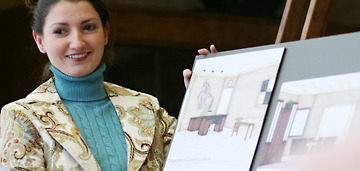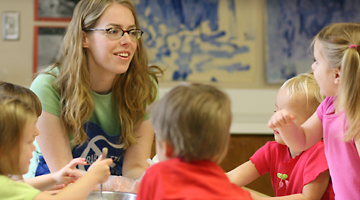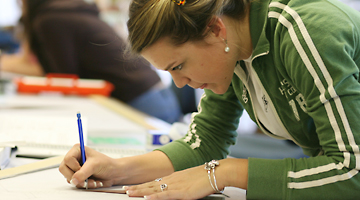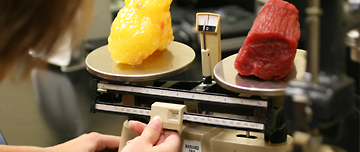Family Designs
Today's study of family and consumer sciences is far-reaching, multifaceted, high tech, computer-aided and the starting point for careers across the professional spectrum. It is not your mother's home ec class, but it is all about home, family and community.
"It's really all-inclusive of what family is and how each program area will be a valuable asset to the members during their lives," says Suzy Weems, BS '65, who became chair of the department in August. "Survival, beauty, living conditions, successful child-rearing and child development, the role family plays, the role of each member of that family" are all part of the holistic approach the department instills, she says.
A department within the College of Arts and Sciences, FACS offers a bachelor's of science in family and consumer sciences and bachelor's of science or arts degrees in six areas: child and family studies, fashion design, fashion merchandising, interior design, nutrition science and general family and consumer sciences, with an option for teacher certification. The department enrolls about 450 students in the department, with 75 to 100 students in each concentration.
Studies throughout the department have kept abreast of fast-changing societal needs and applications. "Instead of cooking, sewing and babysitting, now, it's much more involved with professional development and contributing to the body of knowledge with the discipline," says Weems, who came to Baylor from Stephen F. Austin University, where she was Regents Professor, coordinator of the foods, nutrition and dietetics programs and director of the didactic program in dietetics. "Many of the programs within the discipline are strongly entrenched in more traditional sciences."
For example, nutrition sciences not only delves into baking, but also biochemistry. Because of its science-heavy content, nutrition majors take classes with pre-med students and sometimes attend medical school following graduation. Interior design and fashion merchandising students create their work on the latest computer-assisted design (CAD) software in the department's Parker Design Center.
Tyler Dickey, a junior majoring in nutrition science, was a former pre-med major who switched to nutrition science. "In nutrition, there are a lot of hard-science classes, a lot of biochemistry classes," he says, so it made changing majors doable for him.
Weems says that each area has adapted to modern technological advances. "Interior design is certainly not just hanging pictures and trying to make things look good. But it's the actual designing of functional space, probably more similar to what you'd picture with architecture," Weems says.
Former chair Rita Purdy shepherded the FACS department through most of its accreditations during the past nine years. She holds a doctorate in clothing and textiles from Virginia Polytechnic Institute and came to Baylor in 1996 from Virginia Tech, where she was dean of undergraduate programs for 16 years.
"We believe in community vitality. We believe in increasing the capacity of people to use their time more wisely, their physical strength more wisely, to use their personality in situations to help them," says Purdy, who continues to teach in the department. "We believe in working with people across the life-span. There are so many dimensions to our profession that are misunderstood."
In many ways, Baylor's FACS program is not just about focusing on an individual skill, but exposing students to all aspects of the program. Students must take courses from each of the different disciplines and attend a perspectives class, taught by Purdy, that explores the interconnectedness of each area and possible careers.
Greer Fulton is a senior in interior design, and she remembers how her class had to maneuver around the Bill Daniel Student Center in wheelchairs in order to test for American Disabilities Act compliance. "Now being in the Family Development class, learning all that stuff on the interior design side and now seeing the family development side of it and merging the two, it all comes together," she says.
"One of the unique aspects of our major is the synergism created by all of the programs. Our graduates are not 'just' fashion professionals or designers, but they are equipped to appreciate and serve the entire family," Weems says. "Each professional is stronger and more competitive because of their knowledge in the other disciplines within the department."
Accreditation
Last fall's open house at Parents Weekend did more than showcase the work of the interior design students. It also was a celebration of the program's recently announced accreditation by the Foundation for Interior Design Education and Research (FIDER). After a lengthy review process, auditors of the foundation made a site visit in July and later informed Baylor of its accreditation.
"They were extremely pleased with the quality of the students and the professionalism of their presentations," says Adair Bowen, assistant professor and coordinator of the interior design program. "Graphic and verbal skills -- those are probably the areas we scored highest in."
Accreditation is crucial in Texas, a state that requires interior design practitioners to be registered. Baylor's program prepares students to take the National Council for Interior Design Qualification exam following a two-year official internship postgraduation, the final requirement for state licensure.
That accreditation completed the department's sweep. "Every program that can be accredited in this department is now accredited," Purdy says.
The FACS department itself is accredited by the American Association for Family and Consumer Sciences. The nutrition sciences program is accredited by the Commission on Accreditation for Dietetics Education of the American Dietetic Association, which requires dietitians to complete an approved internship and pass a registration exam in order to practice. "I believe our students have the highest pass rate on that exam of any program in Texas," Purdy says. "I think [the auditors] were really blown away because they had no recommendations [for improvement]."
Professionals at work
In addition to stringent academic requirements, FACS students also must complete an internship or practicum, and they receive intensive advising from faculty members. It's a combination that assures most students find the internships and the careers they most desire.
"The students have to tell us what it is they want to learn and then we negotiate with the people who will supervise them to see if they will allow them to do that," Purdy says. "They have to report weekly on what they're learning and how they're meeting their goals, but also how they are applying what they've learned."
Students must complete a 240-hour internship, except for those majoring in child and family studies, which requires a 150-hour practicum.
Senior Fulton interned last summer at Wilson and Associates, a Dallas design firm where she has been invited to return for her certification internship after graduation this May. She spent her summer designing guest suites for the Atlantic Hotel in Saudi Arabia and the Palm Casino expansion in Las Vegas.
"Everything they asked me to do I was able to do, be it hand drafting or elevations and sketches, or 'Hey, we're sending you down to the Design District to pick out this type of fabric,'" she says. "My classes prepared me very well. We have to take into consideration and learn so many codes. ... There's so much to cover to help the community. Our projects have addressed all ages and all sizes."
Some students choose to go overseas for their internships or on a FACS study abroad tour, which is offered every other summer in different countries -- this summer in France and Italy. The internships take place before the junior year so that if students find they need more education in a certain area, they can get it before graduation.
Elisa Oros, a child and family studies major who plans to enter pediatric medicine, will complete a 300-hour practicum at Children's Medical Center in Dallas this spring. She's doing twice what is required simply because she wanted the additional experience. She will be conducting therapeutic play with chronically ill children and interacting with their families. Oros says that faculty members helped her get the right internship for her career goals. "I went to [them] and said, 'This is what I'm interested in,' and they threw out numbers, and I called ... and narrowed it down," she says. "Our faculty is very supportive; they have great contacts."
Oros also spends a couple of hours a week watching and interacting with toddlers at the Piper Center for Family Studies and Child Development to fulfill requirements for her child development classes. Accredited by the National Association for the Education of Young Children in 2000, the pre-school through kindergarten center is one of a few such places that also offers year-round day care. She works individually with children age 4 and younger.
"I'm so happy that this year I'm in the toddler room, which is 3-year-olds -- I'm with the class that I started with three years ago," Oros says. "It's been a good opportunity for me to actually see the same children develop, and I can apply the [developmental] stages."
Whatever area a student wants to study, faculty are committed to helping them achieve their goals. "Advising is intense," Weems says. "I know the dedication of the faculty is really incredible with respect to how much they want to help and enable the students to find their strengths and then maximize them."
Endless possibilities
Graduates of the department enter a variety of professions beyond their specific fields, some of which include fashion journalism, law, medicine, costume design for films, hotel management, marketing and law enforcement, to name a few. Weems says that because students are exposed to many different disciplines within the department, the possibilities are limitless.
Dickey chose to pursue a nutrition science major in part because of the myriad career options it provides. "Nutrition affects people every day, and they don't even realize how much health and nutrition can change a person," says Dickey, who hopes to work in the food service industry.
Faculty members also are dedicated to helping students feel prepared and confident upon graduating. Purdy brings in successful alumni to talk to classes and helps students attend professional meetings when available. "My goal is to teach and mentor students so that when they graduate, they can get a job I hope they will be fulfilled in, but also not be in a position that they don't know anything about," Purdy says. "We try to encourage our students to think of themselves as professionals right from the beginning."
The faculty's approach works well for Oros. "I don't know anybody who hasn't been placed in a job after graduating from our department," she says. "When I graduate, I'll be comfortable jumping into something or going to medical school and working with children with these traumatic illnesses. I'll have experienced it before, so it'll be easier."
Christopher Alexander, an interior design major who graduated in May, went straight to work at Deborah Goolsby Interiors in Dallas, where he interned as a junior. He and Goolsby work closely together on each project, and in September, his first completed project opened -- a Mexican restaurant. "Today I am actually able to see my ideas and thoughts built on a larger scale. It's an amazing feeling," he says.
Alexander says he's been able to handle every responsibility given to him since graduation. "I feel like they prepared me so much that once I started work, I knew exactly what I was doing," he says.
"I see a lot of job opportunities for our students," Weems says. "I encourage them to 'look at what you can do and look at what needs to be done, and you're probably ready to do it.' A background in all those areas helps you appreciate the professionals within each."



